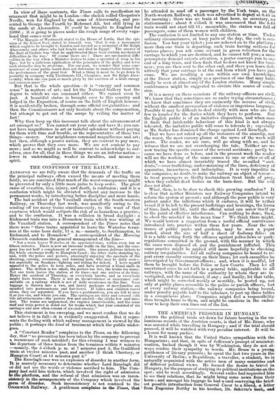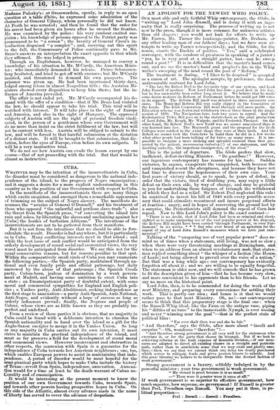THE AMERICAN PRISONER IN HUNGARY. Anon} the political trials set
down for future hearing in the vo- luminous records of the Austrian courts, is that of Mr. Bowe, who was arrested while travelling in Hungary ; and if the trial should proceed, it will be watched with very peculiar interest. It will be a lesson for many parties. It is well known that the United States sympathise with the Hungarians ; and that, in spite of Jefferson's precept of noninter-,
backed though it was by Washington, they do not al- ways confine their sympathy to words. Mr. Brace is a „rung gentleman of literary pursuits ; he spent the last two yearam the- University of Berlin; a Republican, a traveller, a staulent, he is naturally acquainted with the active men of many eoiintries and of different political views. He formed the desire to travel in Hungary, for the purpose of studying its political, institutions en the spot; and he went accordingly. -Several exiles had requested him to see their relations, that he might bring some news irnm. their home ; and amongst his luggage he had a card conveying the brief- est possible introduction from General Gikez to a friend, a letter from Eugenius Boetly to his brother, Dr. Schfitte's book, and
Madame PuLszky's: at Grosswardein, openly, in reply to an open question at a table d'hôte, he expressed some admiration of the character of General Ujhazy, whom personally he did not know. At Pesth he was arrested; and then he found that the order for his arrest had been given six hours after he crossed the frontier. He was examined by the police : his very candour excited sus- Picion • his knowledge of persons opposed to the Patriot party was pronounced to be "a screen" ; the brevity of General Czecz's in- troduction disguised " a complot " ; and, carrying out this spirit to the full, theCommissary of Police continually gave to Mr. Brace's answers an interpretation the exact opposite to that which they affirmed. He was lodged in prison.
Through an Englishman, however, he managed to convey. a knowledge of his situation to Mr. M'Curdy, the American Minis- ter ; who immediately demanded his release. Prince Schwarzen- berg hesitated, and tried to get off with excuses ; but Mr. M'Curdy insisted, and threatened to demand his own passports. The prisoner was given up. He had been imprisoned thirty days, lodged among felons in almost Neapolitan filth ; the Austrian Mi- nisters showed every disposition to keep him there ; but the in- fluence of America prevailed.
The affair is not ended yet. Mr. M'Curdy accompanied his de- mand with the offer of a condition—that if Mr. Brace had violated the law, he should appear to take his trial. This trial will be watched with interest. It will take place in the sight of Europe and America, and also in the sight of Hungary. The oppressed subjects of Austria will see the right of personal freedom vindi- cated, in the person of a gentleman whose own Government will do no more than insist on the strict fulfilment of the law, but will not be content with less. Austria will be obliged to submit to the law, and will be forced to that hateful submission at the dictation of a distant state. It will be brought to that submission, that dic- tation, before the eyes of Europe, even before its own subjects. It will be a very instructive trial.
We do not see how Austria can evade the lesson except by one course—that of not proceeding with the trial. But that would be almost as instructive.



























 Previous page
Previous page